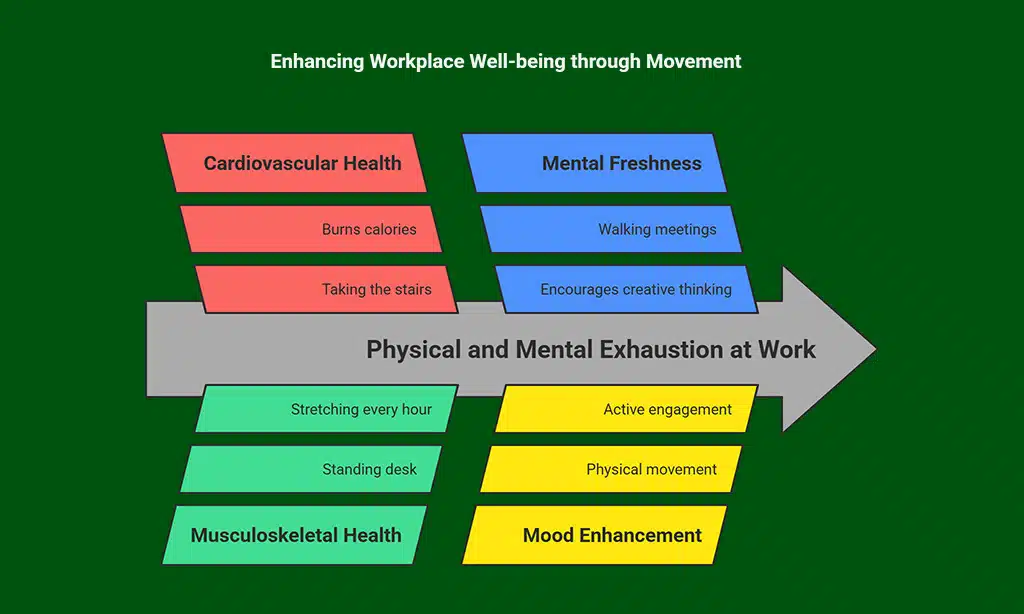Mental health is just as important as physical health, especially in the workplace. A stressful and toxic work environment can lead to burnout, anxiety, and even depression. On the other hand, adopting positive workplace habits that boost your mental health can improve focus, efficiency, and overall job satisfaction.
In today’s fast-paced work culture, prioritizing mental well-being is essential for sustained productivity and happiness.
By incorporating small but impactful changes, employees and employers can create a healthier work environment that fosters success and well-being.
10 Workplace Habits That Boost Your Mental Health
Developing healthy workplace habits that boost your mental health is essential in today’s demanding work culture. Whether you’re working in an office or remotely, cultivating the right habits can help reduce stress, increase focus, and improve overall well-being.
Let’s explore the top ten strategies you can incorporate into your daily routine to foster a mentally healthier work environment.
1. Start Your Day with a Mindful Morning Routine
How you start your day has a significant impact on your mental health at work. A rushed and stressful morning can set a negative tone for the rest of the day, while a mindful and structured routine can help you stay calm and focused. Taking a few moments to set intentions for the day, practice mindfulness, or engage in physical activity can make a big difference in your overall well-being.
Benefits of a Mindful Morning Routine:
- Reduces stress and anxiety before work
- Helps you stay focused and energized
- Enhances emotional stability and mental clarity
- Increases overall job satisfaction
Simple Morning Habits to Adopt:
| Habit | Benefit |
| Wake up 30 minutes earlier | Avoids rushing and reduces morning anxiety |
| Practice meditation or deep breathing | Promotes relaxation and mental clarity |
| Plan your tasks ahead | Increases productivity and reduces last-minute stress |
| Have a nutritious breakfast | Fuels the brain for better focus and energy levels |
2. Set Clear Boundaries Between Work and Personal Life
One of the biggest challenges in today’s digital age is separating work from personal life, especially for remote workers. Without clear boundaries, work-related stress can spill into your personal time, affecting your overall mental health.
Ensuring a work-life balance not only helps you stay mentally fit but also enhances long-term job satisfaction and performance.
How to Set Effective Boundaries:
| Strategy | Impact |
| Define strict working hours | Prevents burnout and allows time for personal life |
| Avoid checking work emails after office hours | Reduces stress and promotes relaxation |
| Communicate availability with colleagues | Prevents unnecessary work-related interruptions |
| Create a dedicated workspace | Enhances focus and minimizes distractions |
3. Take Regular Breaks to Recharge
Working long hours without breaks can lead to mental fatigue and decreased productivity. Short breaks help refresh your mind and improve focus. Studies show that stepping away from work for a few minutes can significantly enhance cognitive function and creativity.
Benefits of Taking Breaks:
- Prevents burnout and reduces stress
- Boosts creativity and problem-solving skills
- Improves physical and mental well-being
- Enhances overall job performance
Best Break-Time Activities:
| Activity | Benefit |
| Stretching exercises | Improves circulation and reduces muscle tension |
| Short walks outdoors | Boosts mood and provides fresh air |
| Listening to music | Enhances relaxation and reduces stress |
| Practicing deep breathing | Calms the nervous system and improves focus |
4. Practice Effective Time Management
Poor time management often leads to stress and frustration. When tasks pile up, it becomes overwhelming, negatively impacting mental health. By implementing structured time management strategies, employees can work more efficiently and reduce unnecessary stress.
Time Management Tips:
| Method | Benefit |
| Pomodoro Technique (Work for 25 minutes, take a 5-minute break) | Enhances concentration and prevents fatigue |
| Eisenhower Matrix (Prioritizing tasks based on urgency) | Helps tackle the most critical tasks first |
| Daily task lists | Keeps track of responsibilities and prevents last-minute rushes |
| Time-blocking method | Allocates specific time slots for each task, improving productivity |
5. Create an Ergonomic and Positive Workspace
Your work environment significantly impacts your mental health. An uncomfortable chair, cluttered desk, or poor lighting can contribute to stress and fatigue. A well-organized and ergonomically friendly workspace enhances efficiency and supports mental clarity.
Tips for a Healthy Workspace:
| Change | Benefit |
| Use an ergonomic chair and desk | Reduces back and neck strain |
| Keep workspace clean and organized | Enhances focus and reduces distractions |
| Use natural or warm lighting | Helps maintain alertness and reduces eye strain |
| Add plants or calming decor | Creates a stress-free and relaxing environment |
6. Maintain Open Communication with Colleagues
A lack of communication can lead to misunderstandings, stress, and workplace conflicts. Open and transparent communication fosters a positive and supportive work environment, promoting collaboration and trust among employees.
How to Improve Workplace Communication:
| Technique | Outcome |
| Active listening | Improves understanding and reduces conflicts |
| Encouraging feedback | Creates a culture of mutual respect and continuous improvement |
| Using collaboration tools | Enhances remote communication efficiency |
| Expressing appreciation | Strengthens workplace relationships and morale |
7. Incorporate Physical Movement into Your Workday
Sitting for long hours without movement can lead to physical and mental exhaustion. Incorporating movement helps refresh your mind and body, preventing health issues and improving mood.
Easy Ways to Stay Active at Work:
| Activity | Benefit |
| Taking the stairs | Improves cardiovascular health and burns calories |
| Standing desk | Reduces back pain and enhances energy levels |
| Stretching every hour | Prevents stiffness and promotes relaxation |
| Walking meetings | Encourages creative thinking and active engagement |
8. Prioritize Healthy Eating Habits at Work
What you eat directly impacts your brain function and energy levels. Poor nutrition can lead to fatigue and stress, while healthy food choices support mental clarity and sustained productivity.
Healthy Snack Options:
| Snack | Benefit |
| Nuts and seeds | Provides essential healthy fats and boosts brain health |
| Fruits like bananas and apples | Offers natural sugars for sustained energy |
| Dark chocolate | Reduces stress and enhances mood |
| Green tea | Supports focus and mental clarity |
9. Manage Workplace Stress with Relaxation Techniques
Stress is inevitable at work, but managing it effectively is crucial for mental well-being. Simple relaxation techniques can reduce anxiety and enhance resilience against daily challenges.
Effective Stress-Relief Techniques:
| Technique | Benefit |
| Deep breathing | Helps regulate emotions and decrease stress levels |
| Meditation | Enhances focus and promotes a sense of calm |
| Journaling | Provides an outlet for emotions and self-reflection |
| Listening to calming music | Lowers cortisol levels and relaxes the mind |
10. Seek Professional Support When Needed
Recognizing when you need help is a sign of strength, not weakness. If workplace stress becomes overwhelming, seeking support from professionals can be beneficial.
Available Support Options:
| Support Option | Benefit |
| Employee Assistance Programs (EAPs) | Provides confidential mental health resources |
| Therapy and counseling services | Helps develop coping strategies and emotional resilience |
| Mental health workshops and seminars | Raises awareness and offers practical stress-management skills |
| Peer support groups | Encourages shared experiences and mutual encouragement |
Takeaways
Developing workplace habits that boost your mental health is essential for maintaining productivity, happiness, and overall well-being. By incorporating these ten strategies, you can create a more balanced, stress-free, and fulfilling work life.
Employers should also foster a culture that prioritizes mental wellness, ensuring a supportive and healthy work environment for all.







































